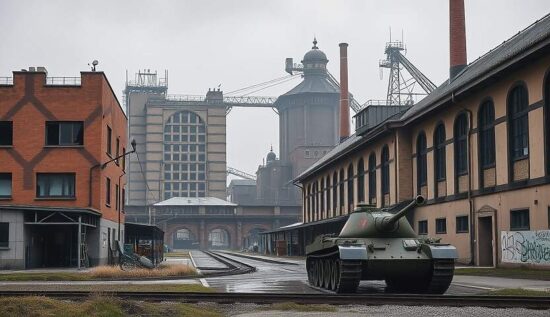For over 175 years, the city of Görlitz in Saxony has been producing rail vehicles. This era is now coming to an end, as the French-German arms company KNDS is taking over the Alstom rail vehicle factory in Görlitz, according to a report by the MDR. German Chancellor Olaf Scholz was present at the signing of the agreement, calling it a “very good news that industrial jobs will be preserved”, although Alstom is leaving Görlitz.
However, not all jobs will be preserved, as 120 of the total 700 jobs are expected to be lost in the course of the transition. KNDS plans to produce various parts for the Leopard 2 tank and the Puma infantry fighting vehicle in Görlitz.
Production of double-decker trains for Israel and trams for Göteborg and Magdeburg will continue in Görlitz until 2026. “Depending on the project status, these orders will either be completed in Görlitz or transferred to other sites” explained Alstom and KNDS.
Florian Hohenwarter of KNDS said in Görlitz that “reliability and long-term thinking” are important to the company, which is true for Görlitz. The change from wagon production to arms production is only possible with an outstanding workforce, which is why KNDS chose Görlitz and plans to invest a two-digit million amount in new equipment.
Saxon Prime Minister Michael Kretschmer praised Chancellor Scholz for his engagement, saying that without his efforts, the continuation of the factory would not have been possible. He welcomed the fact that industrial jobs and know-how are being secured. “By expanding our production capacities in Görlitz, we are strengthening Germany’s defense capabilities” said KNDS manager Florian Hohenwarter.
Not everyone is enthused about this development. There was a lot of criticism of the arms production before it began. Scholz dismissed the criticism, saying that “this production in Görlitz” ensures more security in Germany. He advised against giving in to the protests against the factory, as Germany has the ability to adapt to new trends. “The story of Görlitz is far from over” he said.
Scholz linked the retooling of the factory to the “Russian invasion of Ukraine.” Since then, a special credit line of over 100 billion euros has been made available for arms purchases. “It is equally important to build a capable defense industry in Germany and Europe” he emphasized, as previously, there had been no permanent production of the most important military equipment. “We will change that and for that, we need a much closer coordination between the European countries.”
The construction of the defense industry at the cost of civil production has also faced resistance in politics: various parties have protested against the retooling. The Left in Görlitz had called for a rally in front of the wagon factory, while the BSW and the Free State of Saxony had called for protests and vigilances in front of the factory grounds. According to the police, around 100 people took part in the protest actions. When the Chancellor’s motorcade entered the factory grounds, Scholz was called a “criminal” by some of the protesters.
The Left in Saxony sharply criticizes the shift in the Görlitz factory’s production. Stefan Hartmann, the state chairman in Saxony, said: “It’s a scandal that Scholz is being celebrated for replacing double-decker trains with Leopard tank parts. The government is sacrificing the important rail construction in the name of militarization.”
The Left also criticizes the job cuts. Görlitz has to swallow a bitter pill with few positive side effects. “We are still convinced that with honest efforts from the government in the federal and state levels, it would have been possible to hold on to a future industry like the rail construction in Görlitz” said Mirko Schultze, the district chairman of the Left in Görlitz.
Jens Hentschel-Thöricht from the BSW criticized the “militarization of society.” The federal government should invest less in arms and more in infrastructure, education and social projects, he demanded, adding that the end of rail wagon production in Görlitz contradicts the proclaimed transport revolution.
Even among the workforce, “a considerable part” is unhappy with the fact that in the future, arms will be produced, said the BSW state parliamentarian. They will be looking for new jobs. At the same time, Hentschel-Thöricht distanced himself from the AfD, which was also present in Görlitz with similar demands.
Görlitz Mayor Octavian Ursu (CDU) sees the takeover of the factory as an opportunity and refers to the nearby town of Niesky, where the wagon factory for freight wagons was closed. He also points out that the Bundeswehr’s tanks are being maintained in Görlitz.





